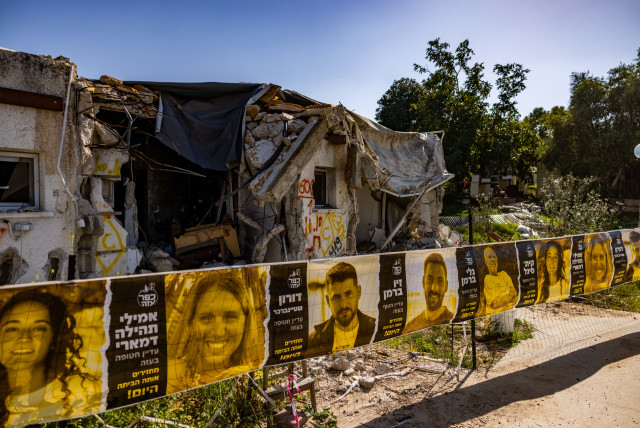While we believe Israeli women, the world must believe them too - opinion

When women come forward as survivors of sexual assault and gender-based violence, they are usually met with support and sympathy - victims and survivors of Oct. 7 have not been treated with humanity.
‘Share the stories,” was the answer from every single survivor, witness, first responder, and sexual violence advocate we met with when we asked, “What can we do?” the pain and sadness in our eyes mirroring theirs.
Why should those who have lived through the most horrific violence during an atrocity documented in real time by the perpetrators themselves, need to ask anyone to tell their stories? To believe them?
It’s quite simple, really. It’s because the world, and those who claim to #BelieveAllWomen, have distorted and denied the truth of what happened in Israel on October 7 and what continues to happen to the hostages.
Over four days in Israel last month, our delegation, “I Believe Israeli Women,” met with survivors and experts to be able bear witness to the atrocities, learn about and understand the ongoing needs, and build a network that will amplify the voices and develop action plans across varied disciplines and arenas of expertise in the United States and Israel. What we heard again and again, were the echoes of a common refrain: The survivors of October 7 are speaking out – and we in the Diaspora have a critical role to play in amplifying the truth.
Walking the paths of destruction in Kibbutz Kfar Aza and standing in the open fields at the Nova musical festival in southern Israel broke our hearts. We saw the holy ground where Israelis were brutally mutilated, raped, burned, killed, and left for dead. We heard from survivors and first responders who shared detailed accounts of what they had experienced, seen, touched, and heard – as well as the immense needs that have emerged in this new reality.
When women come forward as survivors of sexual assault and gender-based violence, they are usually met with support and sympathy – and the perpetrators are condemned. The victims and survivors of October 7 have not been treated with such humanity.
Instead, many have denied the atrocities of sexual violence that occurred on that day, or demanded that the survivors furnish evidence of the attacks. When The New York Times published “Screams without Words,” with evidence on Hamas’s use of sexual violence, the reaction on social media and in outlets such as The Intercept was not outrage but doubt, and a demand for proof.
Similarly, the UN secretary-general’s report, which cited clear and distinct evidence that sexual violence had occurred, was met with harsh criticism and skepticism.
Even more recently, there was deafening silence in response to the release of the video of young female IDF soldiers being taken hostage. Video that was filmed and uploaded to social media by the terrorists themselves. Where is the world’s outrage?
Jewish women and their safety remain outliers in feminist advocacy
No one said “resistance by any means necessary” when the Chibok girls were kidnapped. No one blamed Ukraine for the rape of Ukrainian women. And, no one asked for more evidence when the Yazidi women were burned. But there is a difference when it comes to Israel. Instead of being supported, Israeli women are either disbelieved or blamed.
I Believe Israeli Women is a movement created in partnership with the Seed the Dream Foundation and Jewish Women International to address this disinformation and denialism. The movement stands in solidarity with Israeli women, men, and children – and is a growing network that will speak out against the use of gender-based violence as a weapon of war.
We refuse to be silent. We must ensure that the truth is heard.
We call on everyone committed to eliminating sexual violence and assault to join us in standing with Israeli women, men, and children.
The way to help support them is simple: Believe them, believe the evidence. Hold as an incontrovertible fact that Hamas used sexual violence as a weapon of war against Israeli women, men, and children on October 7 and that ongoing sexual violence is believed to be presently committed against Israeli hostages still in Gaza. It is only when we acknowledge the truth, that we can counter the disinformation.
Meeting the survivors of October 7, some of the released hostages, and the many compassionate therapists, caregivers, and first responders committed to providing ongoing relief was deeply inspiring. The strength these individuals have shown in the wake of tragedy and trauma is a testament to the indomitable resolve of the Israeli people.
But the trauma is ongoing. The needs on the ground are high – and will likely increase in the coming months and years. We have an obligation to speak up and support the survivors – especially those subjected to sexual violence – and to become the voice screaming out for those who are no longer with us.
It is time to stand up and believe Israeli women. It is time to believe the evidence. It is time to amplify the voices of those who have suffered and those who are suffering. It is time to bring the hostages home. It is time to demand accountability and ensure that the victims of October 7 are not forgotten.
Our movement begins by saying out loud, “I believe Israeli women.” Please join us: jwi.org/ibelieveisraeliwomen.
Dr. Marcy Gringlas is president of Seed the Dream Foundation. Meredith Jacobs is CEO of Jewish Women International.
Jerusalem Post Store
`; document.getElementById("linkPremium").innerHTML = cont; var divWithLink = document.getElementById("premium-link"); if (divWithLink !== null && divWithLink !== 'undefined') { divWithLink.style.border = "solid 1px #cb0f3e"; divWithLink.style.textAlign = "center"; divWithLink.style.marginBottom = "15px"; divWithLink.style.marginTop = "15px"; divWithLink.style.width = "100%"; divWithLink.style.backgroundColor = "#122952"; divWithLink.style.color = "#ffffff"; divWithLink.style.lineHeight = "1.5"; } } (function (v, i) { });

